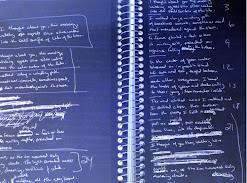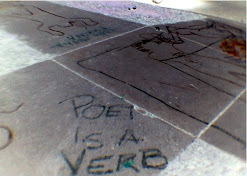... a day late. Sorry for the delayed discussion post, but I've been busy prepping for Super Duper Tuesday. (Please vote or caucus, if you're in a Super Tuesday state.)
At any rate, here are the questions:
Overall, did you like the book? What about it did you like?
Were there specific poems that spoke to you? Which ones? Why?
Was there anything that confused you about the overall book? What was it?
Were there any individual poems that confused you?
How would you describe the author's style? How did she use language to convey images, ideas, or voice?
How would you describe the structure of the book? Did you see any sense of movement or progression from one poem to the next?
Would you choose to read this author again? Why or why not?
Friday, February 1, 2008
Poetry Book Club Discussion: Matthea Harvey's Modern Life
Posted by Jessica at 9:50 PM
Labels: poetry book club
Subscribe to:
Post Comments (Atom)



4 Comments:
Okay. I'll start. I have some of Mark's family in town this weekend so won't be able to check back in until Monday.
Overall, did you like the book? What about it did you like?
I loved the book. It took a little, but not much, time to get the feel of her language and then I was completely captivated. I liked how imaginativly and captivatingly she handled rather dispiriting topics. She didn’t hedge, but it wasn’t bluster. She wasn’t shy, but it didn’t feel heavy handed. That is what impressed me the most. How much fun I had reading such sad words.
Were there specific poems that spoke to you? Which ones? Why?
I especially liked the Robo-Boy series. They were evocative and surrealistic. I could see the future in them, even more so that the Fear of Terror and Terror of Fear series. Though I liked those a great deal. Great loose form (I can’t blame Jessica for trying it out – and I do think you did well with it.)
The ones I starred as I read were: TFOT/2, Robo-Baby, Restricted Vista, Your Own Personal Sunshine, Free Electricity, TOTF/8 (This Might Be My Favorite), Strawberry On The Drawbridge (but it might be this one). I was amazed by the idea of “I Would Have Stayed” and thought it was brilliant, especially after having read the explanation in Notes.
Was there anything that confused you about the overall book? What was it?
Not after I got into it. It just took about three poems to start hearing her voice. I’d love to hear why she – or editors – arranged poems the way they did. It seemed to move from personal to observational (of couples) to broad world views.
Were there any individual poems that confused you?
The only poem I didn’t like at all was Dinna’ Pig. It was too much for me. I read it over a few times, to see if I could work through the disturbing images. And I decided I could just find the idea repulsive and not live it. Perhaps she’s a vegan. I think it was brutally honest. But I didn’t like the facts it was confronting.
How would you describe the author's style? How did she use language to convey images, ideas, or voice?
I am pretty sure I read some of her work for a short prose class I took. (I should dig out the copies…but she is so recognizable to me.) She densifies language so well. Just packs it in, every single word counts. Layers on layer.
How would you describe the structure of the book? Did you see any sense of movement or progression from one poem to the next?
This is always hard for me to see. I don’t get it. I don’t know what to look for.
Would you choose to read this author again? Why or why not?
Oh, yeah.
Here’s a few links yall may have already spotted:
An interview at Bookslut, http://www.bookslut.com/features/2007_10_011810.php;
one at Tarpaulin Sky, http://www.tarpaulinsky.com/Fall06/Harvey-interview.html and a personal blog page by someone who loved “Dinna' Pig” and had some interesting things to say about hearing Harvey read.
Good read!
Overall, did you like the book? What about it did you like?
I went on a wild ride of the imagination reading Modern Life. At times I felt like a cork bobbing and toppling in the ocean, yet at the same time I was swimming along under the current of her images. I especially felt this way while reading her abecedarius poems.
Were there specific poems that spoke to you? Which ones? Why?
I loved “Free Electricity” for the sheer delight I took in seeing how far reaching the poet’s imagination goes. “Restricted Vista” is another that opened my mind to new ways of viewing the material world. Most of her poems put the world on its head for me. Robo-boy was an endearing character, and I liked reading about him across a few poems. “Museum of the Middle” showed the poet’s sense of humor, which was nice for a change. I tend to be super serious, and I liked how she took me away from that mode of being.
Was there anything that confused you about the overall book? What was it?
I had to warm up to Matthea Harvey’s approach, which is so totally new to me, and unique. But after I got into the flow of her words, I was in heaven! Which is not to say that reading her poems wasn’t a challenge. But I like a challenge.
Were there any individual poems that confused you?
Yes. I didn’t get “Other (be specific)” I’d love to hear someone else’s explanation.
How would you describe the author's style? How did she use language to convey images, ideas, or voice?
She looks at objects and events from a viewpoint that is all her own. She turns everyday things inside out. I thought about a philosopher, who urged the reader to look at the empty spaces that occupy the room as being part of the room. Matthea takes what we don’t see, and makes it real. That’s what I loved about her poems.
I also enjoyed how she included me in the poems. She used “we” a lot, as if I were one of a group that also included the narrator. I especially felt this way reading the Terror of the future poems.
How would you describe the structure of the book? Did you see any sense of movement or progression from one poem to the next?
Well, yes, especially the abecedarius ones showed an evolution of sorts. I can’t say I’ve studied the poems closely enough to answer this question too well. Basically, I’d say she interprets modern life in a zany way. It’s as if her poems are graphic representations of what a sculpture of found objects looks like. Each poem was, in a way, pieced together with odds and ends of her imagination, often leading me to a philosophical conclusion. Right now I can’t say what that conclusion is, but when I read her poems I knew. Does that make sense?
Would you choose to read this author again? Why or why not?
Yes, I intend to read her other collections. She’s amazingly gifted.
Thanks for jumping in, ladies. As you can see from my recent post, I've been busy. (Vote Tuesday.)
Overall, did you like the book? What about it did you like?
Yes, I really enjoyed the book. I appreciated her sense of wit (I wouldn't call it humor necessarily) and her innocent yet skewed perception of the world. I feel like she takes things we take for granted in the world and gives us a new vision of them. They are remade in our eyes as weird and alien. That's the mark of a good poet. (Kind of piggybacking off of mariacristina's idea here.)
Were there specific poems that spoke to you? Which ones? Why?
Like deb, I enjoyed the Robo-Boy series. I also enjoyed the Terror of Future/Future of Terror series, and I liked the caveman "first insntance of..." series. I like her series. I also enjoyed many of the poems towards the end, like the Strawbrerry on the Drawbridge and the final poem.
Was there anything that confused you about the overall book? What was it?
I wouldn't say confused. Her points are pretty darn clear, even if they are odd.
Were there any individual poems that confused you?
Again, not really. I didn't csare for her really short poems -- I think they could have been cut. But, nothing really confused me. (For once. :) )
How would you describe the author's style? How did she use language to convey images, ideas, or voice?
Matthea Harvey's voice is like going to Disneyworld's Tommorowland, slightly tipsy, with a notebook, and interpreting it earnestly. Or, it's like combing through our trash and treating everything we find like a portent. Or it's like flipping channels really fast on satellite tv, and writing down what we see.
Or like all of that put together.
How would you describe the structure of the book? Did you see any sense of movement or progression from one poem to the next?
I like jariacristina's interpretation of this question.
(That's why I like going third.)
Would you choose to read this author again? Why or why not?
I've tried this author before and failed, but now I'm going to try again. Now that I get her voice a bit better, I think that she's definitely a visionary of our times.
Question for the group: What do you think is going on with all the cleaving and halving throughout the book. It's obviously a theme, but I'd be interested to hear what you think of it.
You know, I did notice the cleaving and leaving. I am glad you asked and reminded me of this.
I think that is why I saw the book as a series of the I, the We and the You. (I am probably wrong, but it suits my point, soon to be made :-) , I hope.)
The We's of Fear & Terror show some kind of necessary relationship of "we're all in this together" but at the core, always very much alone. This was because the We's were so fragmented, or even dying, diseased, disturbed. I was experiencing (or talking about) We from such a lonely place. And that is powerful, very human. Very modern life.
Leaving and cleaving is such a strong Judeo-Christian (in Islam, too?) tradition that the question of it has incredible force. Cleave to what in this fractured future.
* * *
Anyway, Yay for Super Tuesday and I won't expect to hear back from anyone tonight. Good luck in MN.
Post a Comment